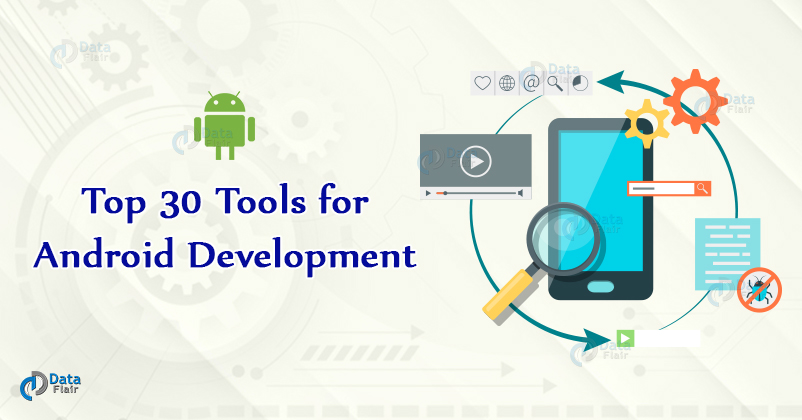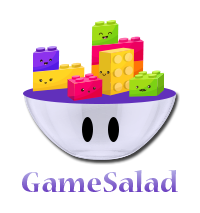Top 30 Android development tools for Developing Android Apps
FREE Online Courses: Your Passport to Excellence - Start Now
Welcome back to DataFlair Android Tutorials.!! In this article, I’m going to tell you about the Top 30 Android development tools. These tools can help you develop android applications at ease. Without any delay, let us get started with these top 30 android development tools.
Best Android Development Tools
Below are mentioned best Android development tools for developing android apps.
1. Android Studio
Android Studio is the Official Integrated Development Environment for Google’s Android System. It has Gradle-based build support and was developed by JetBrain. It provides an easy way to code and develop an Android Application.
Pros:
- It is freely available
- It has emulator support that helps us run and check the app instantly
Cons:
- The emulator might be slow sometimes
- It needs high RAM
2. Appcelerator
Appcelerator Titanium SDK is an open-source framework. It lets us develop various applications for Android, iOS and Windows Phones. It develops apps with a single JavaScript codebase.
Pros:
- Lets us create app flexibly
- It is cross-platform
- Has a scheme-less data storage called ArrowDB
- Helps gain a diverse performance win using native UI components.
Cons:
- It is complex
- Normalization of the UI across platforms
- Various SDK related issues due to versions and build.
3. PhoneGap
PhoneGap was developed in 2011 by Nitobi. The languages it supports are CSS3, HTML5, and JavaScript. It develops applications that are ideal for Android, iOS, and Windows phones. It is an Open-Source tool and has a compiler, debugger, and testing.
Pros:
- Easy to get started with, basic HTML, CSS, and JS are required.
- Supports Rapid Testing and deployment.
- Strong and Robust.
- Provides so much ease at developing an android application.
Cons:
- Doesn’t have a wide UI widget range.
- Lets us develop the apps only once, and charges after that with some monthly fees.
- Doesn’t support all the functionalities.
4. Firebase
Firebase is a mobile and web app development tool. It was developed by Firebase. It is ideal for Android as well as iOS. The languages that it supports are Swift, JS, Node.js, and Objective C. Its services lets app data to be synchronized across clients and firebases.
Pros:
- Provides a wide range of services for the applications
- Easy and concise documentation
- Easy integration.
Cons:
- Lacks aggregation
- Limitations for queries and indexing.
- Doesn’t support SQL databases.
5. Ionic
It is a very popular and widespread HTML5 App development tool. This framework is used to develop Hybrid apps. It was developed by Ben-Sparry and Max Lynch. It helps develop apps for Android, iOS as well as Windows.
Pros:
- Great for rich and robust apps.
- Provides the developers to create apps for stores at ease.
- Supports fast development, at low cost and maintenance.
Cons:
- To develop strong application knowledge of AngularJS is a must.
- In this, debugging is a complex task.
- Randomly, the build might crash without any reason.
6. Eclipse
Eclipse is an Integrated Development Environment(IDE) and is used for Android Applications. It is an open-source framework that is freely available.
Pros:
- Easy to code for the development of the app.
- Provides developers with coding assistance.
- Runs on the top of Java and supports almost every platform.
Cons:
- Implicit enhancements are difficult.
- Creates a problem when there’s a requirement to restart.
7. Bugfender
Bugfender is a tool that lets us access our apps logs from any geographical location. It has everything that happens in the application, that it can easily find the bugs. It can easily reproduce and reproduce bugs and resolve them in a better way.
Pros:
- Supports easy integration.
- Provides crash reporting.
- Provides quick issue tracking.
Cons:
- The log searching is time taking
- It is limited to mobile apps.
8. Appy Pie
This app development tool is cloud-based. It lets the users develop the apps for Android, Windows, and iOS. It makes this process of developing apps in a quick and convenient manner.
Pros:
- Hassle-free & easy way to build applications.
- Easy integration with websites and blogs
- It allows the development of hybrid apps.
Cons:
- Its performance is expected to give simplicity to the process.
9. Jquery mobile
Jquery was developed in 2010, by the J-query team. Its main language is JavaScript. This is also known as the touch-optimized framework. This framework is adaptable for a wide range of smart devices. It is easy to use and implement.
Pros:
- This is compatible with devices with a variety of resolutions.
- It is easy to implement
- It has a fast learning curve.
Cons:
- Implementing it with updated .Net panels can create big issues
- It often fails to return the required HTML classes.
10. Android NDK
Android NDK was developed in the year 2009, by Google. It supports Java and is suitable for both Android and iOS. It follows the process of Software development to create new applications for Android systems.
Pros:
- C/C++ gives an upper hand over Java
- Compiles and runs the app immediately
- Access to multiple coding libraries
Cons:
- Not optimized for complicated apps.
- Minimum Android Studio 2.2 is required.
11. NativeScript
NativeScript was developed in 2014 for Android and iOS. The supported languages are JavaScript and TypeScript. It is an open-source platform and supports building cross-platform apps with a native interface.
Pros:
- Full access to development libraries
- It has Quick Resolution and good follow up
Cons:
- It has the issue of multi-threading
- It doesn’t provide great documentation.
12. RhoMobile Suite
It is an open-source framework, RhoMobile Suite is a set of development tools to build specifically data-centric applications. It develops applications for Android, iOS, and Windows and can even develop applications that are compatible with both Mobiles operating systems as well as Non-Mobile operating systems.
Pros:
- It is great for the development of multi-platform applications
- Even offline-data can be easily accessed by using Rho connects.
Cons:
- Rho-Mobile’s RFID plug-in is not freely available for Windows Mobiles.
13. Convertigo Studio
It is also popular as a mobile backend as a service and was developed by Convertigo for Windows, Android, and iOS. It builds enterprise-class mobile applications therefore, it is used by more than 100K developers all over the world.
Pros:
- It has the feature to build an application in a completely offline mode
- It can totally sync data with its replication feature.
Cons:
- Its free plan doesn’t have support for sync data replication
14. Intel XDK
It is a free IDE to create cross-platform HTML5 apps for the desktop and mobiles. It was developed in 2017 for Android and iOS application development. As per the name, it was developed by Intel and the languages that it needs are Javascript, HTML5, Java, C#, C++, Objective C.
Pros:
- It is completely free to access for developers.
- It can even develop apps that have a native feel.
Cons:
- The app may get crashed sometimes.
- It has slow graphics in some conditions.
15. Xamarin
It is used by the developers to develop native applications for multiple platforms. It was developed in 2011, by Miguel de Icaza and Nat Friedman. The apps built using this is ideal for native UI windows and also for Mac OS.
Pros:
- It has the functionality to test the applications
- It also provides simple applications that are helpful for easy development.
Cons:
- Due to some compatible issues Android and iOS libraries, it resists the building of a complete application
16. Dojo
Dojo was developed in 2005 by the Dojo foundation for Android and iOS. It is good for creating lightweight mobile and web applications. It provides almost everything a developer would need for app development.
Pros:
- It has the fastest execution on the browser.
- Users can customize themes accordingly.
- It has a really vast UI support.
Cons:
- User with low bandwidth might face problems
- Poor Documentation
17. Code Name
Code Name is a set of software development tools to provide code for a number of operating systems. It provides unlimited java to iOS, Android open-source solutions and was developed in the year 2012. It is capable of developing apps for Android, Windows, iOS, and Blackberry.
Code Name has a lightweight user interface toolkit.
Pros:
- It has good IDE support for both Netbeans and Eclipse.
- It is easy, single-click builds.
- Has great documentation.
Cons:
- It needs java support for most of the devices.
18. Fire Monkey
It is a cross-platform graphical user interface framework that is used for user interface creation. These UIs can run on various operating systems as well. It was developed in the year 2011 and develops apps for Windows, Android, iOS, and Mac. It has support for both 3-D and 2-D graphics for apps.
Pros:
- Doesn’t require the existence of any specific team for different platforms or different systems.
- Has low app development costs as the team requirement is lenient.
- Allows us to accelerate the development time as the application is developed for multiple platforms.
Cons:
- Only allows limited access to the hardware
- Requires the internet throughout the development process.
19. Corona SDK
It is a software development kit, and it was developed in the year 2009. It is used to build 2-Dimensional applications and has two modes:
- Stimulator: Apps can be built directly from the stimulator
- Corona Native: It lets us integrate any code with Lua code.
Pros:
- It is completely free and no licensing required
- Needs fast and takes less time for the development of application
- Has terrific marketplace and community
Cons:
- No 3-D support
- No visual editor
20. MEME IDE
Meme Integrated Development Environments(IDE) is a software platform for android mobile apps. It was developed in the year 2011 for Windows, Android, iOS as well as BlackBerry. The languages it supports are Java, C++, and C#.
Pros:
- Easy access to plugins and modules
- Write once, and use anywhere
- Supports cloud services
Cons:
- It might be slow at times.
- Limited support for High-end graphics.
21. Lambda Native
Lambda Native was developed in 2018 by the Pediatric Anesthesia Research Team. It is an open-source cross-platform development environment and supports iOS, Android, Blackberry, Mac OS as well as Linux.
Pros:
- Released under the BSD License
- Supports native applications
Cons:
- It does not support the creation of native User Interfaces.
- It has no independent roadmap, as it is driven by project needs.
22. Mono
It was developed in 2014, by Ximian. Its supported languages are C, C#, and XML. It is ideal for Windows, Mac OS, and Linux. It implements parts of the .NET framework which might be covered by Microsoft patents.
Pros:
- No vendor lock-in
- It has very specific libraries
- .net and C# support
- Access to a few APIs for the secure deployment of apps.
Cons:
- It is not time-efficient
- Not yet up-to-date with new APIs
23. RubyMotion
RubyMotion was developed in the year 2012, for language C, C++, Objective-C, Java, Ruby. It was developed by HipByte and is ideal for Android, iOS, macOS. It helps developers to create a Minimum viable product using skills already available.
Pros:
- Its Read-Evaluation-Print Loops is a great advantage in Ruby Mobile.
- Memory Management is easier while using Ruby Mobile.
Cons:
- It is a closed source platform.
24. ViZiApps
It was developed by ViZi Apps Inc. in the year 2010 and is an online platform that supports both native and web mobile applications. It is ideal for iOS, Android and has a cloud-based builder.
Pros:
- Good product idea and strong techniques.
- Clear management quality.
Cons:
- Management is not well-structured.
25. Marmalade
It was developed in 2016, by Marmalade Technologies Limited. The language it supports is C++. It is ideal for iOS, Android, Windows Phone 8, Mac OS X, Windows, Roku.
Pros:
- Marmalade allows access to graphic rendering capacities of devices.
Cons:
- Occasional bugs in its SDK.
- It is often difficult to publish games on other ecosystems.
26. Live Code
LiveCode was formerly known as Revolution and Meta card and supports java. It is cross-platform and is useful for the fast development runtime environment. It was developed in 2001 by Live Code ltd and is ideal for MacOD, Android, iOS, Unix, Linux as well as windows.
Pros:
- User can learn app development in lesser time
- It runs on Android, Windows, Mac, and iOS.
Cons:
- It doesn’t support Heavy processing applications like High-end graphics and 3-D animations.
- Even now audio recording is not well functioned.
27. Kony
It is an application development framework, developed in 2007. It is best for mobile application platforms. The best thing about it is the drag and drop feature. It is great for the developer with the knowledge of JavaScript.
Pros:
- It has some pre-built applications to help developers.
- Has great support for back-end systems.
Cons:
- It has poor documentation as it is not sufficient.
28. Codename one
It was developed in 2012 by James Tamplin and Andrew Lee. Its supported language is Java. It is ideal for Android, Blackberry, iOs, Windows.
Pros:
- Requires Java Support for most devices
- It has good documentation
- Good IDE support for both Netbeans and Eclipse
Cons:
- It has a host for various useful services for development and Maintenance.
- It provides various services that might be costly otherwise.
29. Game Salad
It is a tool that allows the creation and publishing of games for various different platforms like Android, iOS, HTML5, and OS X.
Pros:
- Easy and use
- Great User Interface
- Easy creation of images, sounds, and various different action paths and attributes.
Cons:
- Cannot provide full-fledged mobile games
30. Sencha
Sencha is an ideal framework that was developed in 2015 and is capable of developing applications for Android, Windows, and iOS. It has a robust data package and many high performing and integrated UI components. It uses HTML5 as the language for app development.
Pros:
- It has built-in themes for important platforms.
- It supports PhoneGap integration for native API access and packaging.
- The data packages at the back-end work independent of the data source.
Cons:
- Limited choices of themes for various targeted platforms.
- There’s a licensing complexity for the commercial version
Summary
In this article, the top 30 Android Development Tools have been discussed for you. This article will help you to know and understand various Android Development tools. Knowing about these android developer tools for android application development is important as these help in the development of a complete android application. And this will also make it easier for you to choose the preferable Android development tool.
Your 15 seconds will encourage us to work even harder
Please share your happy experience on Google












